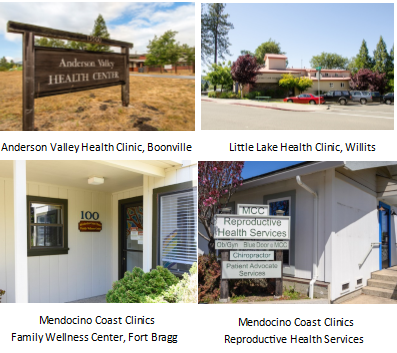In Fort Bragg and throughout Mendocino County, federally qualified health centers (FQHCs) provide excellent outpatient healthcare for the people in our communities, whether those people live on the streets or have high-paying jobs with private health insurance. We are here for everyone. FQHCs, also known as community health centers, assure that healthcare is available to people in medically underserved areas and that people’s financial status will not prevent them from receiving the health services they need, including medical, dental, behavioral health and often, some specialty services.
Since the first FQHC opened in 1965 as part of President Johnson’s War on Poverty, 1,400 FQHCs can now be found across the country serving 28 million people each year. In Mendocino County, we have community health centers in a variety of different geographic areas of the county, including Anderson Valley Health Center in Boonville, Long Valley Health Center in Laytonville, MCHC Health Centers in Ukiah and Willits (and Lakeport), Mendocino Coast Clinics in Fort Bragg, and Redwood Coast Medical Services in Gualala and Point Arena. Together, these health organizations provide healthcare for more 51,463 people in Mendocino County in 2017.
FQHCs are different from other health centers because of the strict requirements we must meet to qualify for the federal funding we receive. We are non-profit organizations governed by boards of directors, at least 50 percent of whom must be our patients. We cannot turn away any patient based on their inability to pay. We provide a broad array of services, focusing on whole-person care. And we must submit quality data to federal oversight to make sure we adhere to best practices to provide the quality patients deserve.
Many FQHCs in Mendocino County go above and beyond those requirements by voluntarily submitting their data to the scrutiny of accrediting organizations like the National Committee for Quality Assurance (NCQA) to earn designations such as Patient-Centered Medical Home. According to NCQA, research shows that Patient-Centered Medical Homes improve quality and the patient experience and increase staff satisfaction—while reducing health care costs.
Although FQHCs adhere to national standards, we are governed and operated locally. This allows us to better understand and adjust to the needs of our patients. I’ll use Mendocino Coast Clinics (MCC) as an example, since I am most familiar with this organization, but many of the FQHCs in Mendocino County have modified their services over the years to be responsive to community needs.
MCC started 25 years ago when the county closed its outpatient health clinics. Initially focusing on primary and preventative care, our services have grown to include wellness exams, diabetes education, chiropractic care and podiatry.
The year we opened, we added behavioral health services, which has since grown from counseling to include psychiatric consultations, psychopharmacology, and suboxone treatment for opiate addiction and pain management.
In 1997, the local dentists requested that the board of directors consider operating a dental clinic for Medi-Cal patients. The private offices couldn’t handle the patient load and the bureaucracy of billing Medi-Cal, coupled with the low reimbursement, made it very unattractive. After finding a building and receiving donated equipment the dental clinic was opened. A few years later, in 2005, MCC began providing obstetrical and gynecology care, including perinatal services, childbirth classes and breastfeeding support. In 2009, the geriatric practice affiliated with MCC and in 2010, we opened the Teen Clinic, now Blue Door@MCC, offering an array of services and education to local youth. In 2011, the local pediatric practice affiliated with MCC, bringing specialized care and service to the community’s infants, children and young adults.
The other FQHC’s around the county have similar stories of filling gaps in health care services and running programs that are targeting their community. Like at Redwood Coast Medical Services, this center runs a home visiting nurse program for seniors who cannot come to the clinic easily for their routine care. For a retirement community like the South Coast, this service is vital. We share similar missions in making health care accessible to our community members. Throughout Mendocino County, community health centers provide essential healthcare services to young and old. We either provide the services directly, or we help connect you with the specialty care you need.
###
Lucresha Renteria is the Executive Director of Mendocino Coast Clinics, a local, non-profit, federally qualified health center offering medical, dental and behavioral health care to people in the coastal communities of Mendocino County.

